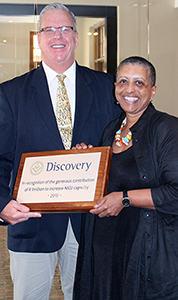Latest News Archive
Please select Category, Year, and then Month to display items
18 October 2021
|
Story Dr Nitha Ramnath

Our podcast guest
Prof Jeandrew Brink holds the post of Associate Professor in the Department of Mathematics and Applied
Mathematics within the Faculty of Natural and Agricultural Sciences at the University of the Free State. Her areas of interest include an analytical interest in Einstein field equations, dynamical systems, algorithms for testing general relativity
and the no-hair theorems, black holes, and gravitational waves. Prof Brink registered for a Bachelor of Sciences in 1998, continued with honours studies in 1999, and completed her master’s degree in 2000. Prof Brink’s research is on various
theoretical aspects of testing general relativity. She is a member of the MeerKAT telescope team that times and detect pulsars. She is also working with members of the Laser Interferometer Gravitational-Wave Observatory (LIGO) to find ways of using
gravitational waves to test Einstein’s theory.
Prof Brink was involved in the compilation of a video of geodesic orbits around a Manko-Novikov singularity, selected to be part of a Starmus 3 concert, the proceeds of which went towards promoting the Stephen Hawking Medal for Science Communication and
to support the charitable activities of the Stephen Hawking Foundation. It could also be part of a subsequent documentary.
Listen to the podcast at
François van Schalkwyk and Keenan Carelse,
UFS alumni leading the university’s United
Kingdom Alumni Chapter, have put their voices together to produce and direct the podcast series. Intended to reconnect alumni with the university and their university experience, the podcasts will be featured on the first Monday of every month,
ending in November 2021. Our featured alumni share and reflect on their experiences at the UFS, how it has shaped their lives, and relate why their ongoing association with the UFS is still relevant and important. The podcasts are authentic
conversations – they provide an opportunity for the university to understand and learn about the experiences of its alumni and to celebrate the diversity and touchpoints that unite them.
For further information regarding the podcast series, or to propose other alumni guests, please email us at
alumnipodcast@ufs.ac.za
For all Voices from the Free State podcasts,
click here.
Neonatal Care Unit receives donation to expand capacity
2015-10-28
 With the best care and technology available,
the survival rate of premature
babies is about 85%. The neonatal intensive
care unit at the Universitas hospital can now
expand its capacity thanks to a donation of
R1 million by the Discovery fund.
From the left is Prof André Venter.
Head: Department of Paediatrics and
Child Health at the UFS, and mrs Ruth Lewin,
Head: Corporate Sustainability at Discovery.
|
The smallest people need the greatest care. This care is being provided by the neonatal unit in the Children’s Wing of the Universitas Hospital. This project of the University of the Free State (UFS), under the leadership of Prof Andre Venter, has led to several miracles regarding child health since its inception.
Now, thanks to a donation of R1 million rand from the Discovery fund, this unit can expand its capacity and treat more premature babies.
About 14% of babies in South Africa are born before the 37th week of pregnancy. These babies are born with a very low birth weight, and are in need of critical care. The neonatal intensive-care unit at Universitas Hospital is currently equipped to take care of about 14 premature babies at a time, from birth to discharge. However, because of the high incidence of premature births in the hospital’s service area, the unit needs about 45 beds.
The aim of the Children’s Wing Project is to expand the neonatal intensive-care unit in order to meet the demands of the hospital’s service area, which reaches as far as the Southern Cape. The Discovery Fund recently donated R1 million to the project, which will be used to expand the capacity of the neonatal intensive-care unit.
“With the best care and technology available, the survival rate of premature babies is about 85%. Without this, half of all premature babies would die,” says Prof Venter, Head: Department of Paediatrics and Child Health at the UFS.
“This is the reason why private and public partnerships, such as the one with Discovery, are essential to make specialised services available to the most vulnerable people. Discovery has made a significant contribution to the project without which we would not have been able to expand the capacity of the unit